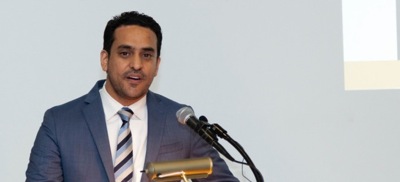Amjad Mahmood Khan
A law professor at UCLA, Mr. Amjad Mahmood Khan has decried the popular perception in today’s 24 hours news cycle and social media that associate Islam with acts of terrorism.
These acts, he noted, were disproportionately emphasized and singled out a recent New York Times report that suggested that after 2001, non-Muslim extremists than by radical Muslims killed nearly twice as many people, but the fewer cases by the radical Muslims grabbed more headlines.
Prof. Khan was speaking at a forum in New York with the theme of “Religion, Freedom and Peace,” organized by the Ahmadiyya Muslim Community.
The Ahmadiyya Muslim Community is a growing international Islamic movement. Founded in 1889, it spans over 200 countries with a membership of around tens of millions. Currently headquartered in the United Kingdom, the Ahmadiyya Muslim Community is the most prominent Islamic organization that overtly rejects terrorism in any form. Similarly, the Ahmadiyya Muslim Community is the only Islamic organization to endorse a separation of mosque and state.
Professor Khan who graduated from Harvard Law School in 2004, where he served as Editor-in-Chief at Harvard Human Rights Law Journal argued that, “in Islam, God has given each person freedom of choice, and given this, what right does anyone have to force or compel others to accept Islam? Forced faith is no faith at all…ISIS is not and will never be true Islam.
Professor Khan asserted that, among the holy books of all religions, only the Qur’an stresses religious freedom in unambiguous terms. Compulsion, he said, is incompatible with religion, as faith is an individual concern and commitment. Essentially, Professor Khan believes that the Qur’an forbids Muslims from forcefully converting others.
Violent responses to provocative or offensive speech are themselves threats to peace, justice, and liberty and are thus prohibited in Islam. There is simply no worldly punishment for speech prescribed in Islam.
Khan who is currently a partner at Brown, Neri & Smith LLP, laced his speech with some anecdotes. Some months ago in Phoenix, Arizona, Khan told his audience a group of 250 protesters on motorbikes gathered outside the largest mosque in that city in an anti-Muslim demonstration. Many of the biker protesters were armed with guns and wore T-shirts that displayed profane messages denouncing Islam.
Professor Khan happened to be in Phoenix that day and he witnessed the deep hatred and anger that consumed many of the protesters. The essential aim of the protesters was to defend free speech in America by intimidating American Muslims on their holy day. The organizer of the protest even admitted in a Facebook post that what he was doing was stupid, but that it was necessary in the name of freedom.
While the protest did not result in any violence between the bikers and Muslims, there was very little progress made towards peace on that day. Rather, the protest caused more Americans to grow further alienated from Muslims and widened the already deep divisions among diverse American cultures. Professor Khan further elaborated on the incident as follows:
“What happened in Phoenix is symptomatic of an unfortunate new norm in America – a growing tension and collision among religion, freedom and peace. This new norm questions whether religion is a force for conflict, not peace, and whether religion is antithetical to freedom and a barrier to human and civil rights. Religion, freedom and peace have come into tension on such issues as free speech on campuses, health care mandates, same-sex marriage and abortion. And while all major religions are not immune from this tension, Islam in America appears to be most under attack.
We’re living at a time where Islamophobia – or a fear of Islam and Muslims – is at an all-time high. According to Pew polls, most Americans hold a negative view of Islam and Muslims, while, at the same time, most Americans have never even met a Muslim. American Muslims have a steep mountain to climb to curb the negative stereotypes that they must battle every day. We have seen protests outside mosques similar to those of the bikers in Phoenix all around the country. Only last month, we saw 20 anti-Muslim rallies held across the country at the same time, including one not too far from here in Queens.
Today, we’ve gathered here to reflect on the theme of ‘Religion, Freedom and Peace.’ In fact, events such as this one are how we ease the perceived tension between religion, freedom and peace. We are here in New York City, with an inter-religious, inter-ethnic audience, brothers and sisters, joined by a common thread of humanity to unite in the promotion of peace.”
Professor Khan continued, “There are some tough questions that need to be answered. Were those biker protesters in Phoenix right? Is Islam opposed to peace? Is Islam opposed to freedom of expression?”
Another speaker Imam Azhar Haneef, who is the national vice president of the Ahmadiyya Muslim Community USA and regional missionary to the central east region, which includes New Jersey, Pennsylvania, and Delaware, echoed Prof. Khan’s views.
In the words of Mr. Azhar Haneef, “religion is the reason we gathered together here tonight. As we mentioned, recently Pope Francis visited our nation. It was remarkable. We could see the love and support for this man, the ‘People’s Pope,’ a man with passion, with love for all humanity. When he came to our congress, he said, ‘All of us are quite aware of, and deeply worried by, the disturbing social and political situation of the world today. Our world is increasingly a place of violent conflict, hatred, and brutal atrocities, committed even in the name of God and of religion. We know that no religion is immune from forms of individual delusion or ideological extremism.’ No religion, which means all of us. There is not a single person who could say that my faith is different or my history doesn’t prove what he said was true. This is politics.
What is the difference between what happened centuries ago and what is happening now in the Middle East? You will find actually there is no difference in human society when it comes to religion. We are not talking about evil and good, you vs.us and we vs. them. The only things we fight against are extremists.”
Please see CMPIMEDIA







